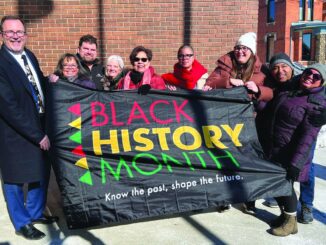By Michael Bennett, Local Journalism Initiative Reporter, The Ridgetown Independent News
A tax increase was inevitable, but East Kent Councillors Steve Pinsonneault and John Wright feel Chatham-Kent Council could have done a better job than the final number approved last Wednesday night.
Council voted 9-8 to accept a 5.64% hike, which works out to an approximate $178 increase for an average home assessed at $173,000, based on its 2016 value.
Pinsonneault and Wright were among the eight Councillors who voted against approving the increase at 5.64%.
“A zero increase wasn’t a reality, but I was hoping it would be around four percent,” said Pinsonneault, who participated in his 17th budget deliberations as he begins his fifth term as an East Kent representative.
“I think we needed to find some more cuts; 5.64 is a hard pill for residents to swallow.”
Wright agreed.
“I would have liked to have seen it under five,” he said. “They (residents) kind of expected an increase, they don’t like it, but it’s the reality for this round.”
With a Consumer Price Index at 6.1%, inflation and the Council’s commitment to increase infrastructure funding while maintaining current services were the main factors in the hefty increase.
“We’re in the highest inflation we’ve ever seen,” Wright said. “You look at fuel, heating gas for the house, food … inflation has just been out of control the last year.”
Municipal administration reported inflation led to upwards of 25 percent increases in material costs for road maintenance in 2022, as an example of the inflationary challenges they faced.
“We knew there would be a tax increase, especially with inflation being as high as it is,” Pinsonneault said.
“But we really need to hope that inflation drops, or we’re going to have a problem,” he said, looking ahead to the 2024 budget.
The East Kent Councillors agree that no one wants to see libraries, arenas, service centres or other amenities in the smaller communities close as cost-saving methods. Still, both feel Council could have delved deeper into finding ways to ease the burden on taxpayers.
Pinsonneault found $100,000 in savings when Council agreed with his motion to put funding aside in the Business Case Growth Plan, the third of a three-year commitment base funding for future building projects, until 2024. However, his two motions to save $175,800 in years 6 of 10 in both the Business Case Strategic Community Issues, a reserve for new initiatives, and New Building Issues, a reserve fund for building new facilities, were voted down.
Pinsonneault, Wright, and many other Councillors were shocked that the budget passed on its first attempt when West Kent Councillor Lauren Anderson brought the motion to the floor.
“Normally, we vote on it, and it gets kicked back, and we find some more spots (for savings), but this time it went through the first time,” Wright said. “But it was to the point, if we cut it anymore, we’d have to cut services, staff, or buildings.”
Ward 2 South Kent’s Anthony Ceccacci and Ryan Doyle, Ward 4 North Kent’s Rhonda Jubenville and Jamie McGrail, and Chatham Ward 6’s Conor Allin and Michael Bondy voted along with Pinsonneault and Wright against accepting the budget.
The nine voting in favour were West Kent’s Lauren Anderson, South Kent’s Trevor Thompson, Ward 5 Aaron Hall and Carmen McGregor, Chatham’s Brock McGregor, Marjorie Crew, Amy Finn and Alysson Storey and Mayor Darrin Canniff.
Council was presented a proposed 6.35% tax increase by the budget committee.
Last June, Council directed staff to deliver a 2023 budget with an increase no greater than the rate of inflation (6.85% at the time) and an additional 1.5% capital levy, which worked out to an 8.35% hike.
Administration found efficiencies and reductions without disrupting current services to get to its 6.35% proposed increase, which worked out to be a $200 hike per average household.
The increase was cut to 5.58% on the first night of deliberations (Jan. 26) by reducing the Construction Index Inflation on the Capital/Lifecycle from 6% inflation ($4,067,400) to 4% inflation ($2,711,600).
But on the second night (Jan. 31), the increase rose to 5.61% as Council approved a number of motions from the ‘not recommend list,’ including an additional $130,000 to the affordable housing reserve and a $38,000 to upgrade WiFi service at Riverview Gardens for staff and IT needs.
Council also approved transferring $1.9 million from reserves for the homeless shelter on Murray St. in Chatham for 2023.
In the Wednesday, Feb. 1 deliberations, another 0.03% was added to get to the final 5.64% increase.
Council added $50,000 to the budget each year for the next decade for a gravel roads study; $120,000 for increased operating costs in cemeteries, parks and trails, with $5,330 earmarked for washrooms in active cemeteries; $100,000 for physician recruitment and retention allocated from reserves; and $9,000 cash for the maintenance of a new pump track for skateboarders and other wheeled enthusiasts at a Chatham recreational facility.
The budget committee also approved a $4.5 million funding request from Chatham-Kent Health Alliance for its Wallaceburg site redevelopment project, an annual cost of $900,000 over five years, with funding from the strategic development reserve.
A request from Indwell for $9.69 million in funding for supportive housing at the site of the former St. Agnes School property in Chatham is not needed this year.
But Pinsonneault’s successful motion on pulling money from the assessment growth funds shaved $100,000 off the increase.
Last year, Council was presented with a projected 4.74% tax hike but passed a 2.79% increase following four nights of deliberations.
The tax increases were 2.40% in 2021; 2.97% in 2020; 2.03% in 2019; 1.62% in 2018; 1.96% in 2017; 1.99 in 2016; and a rare zero tax hike in 2015.





